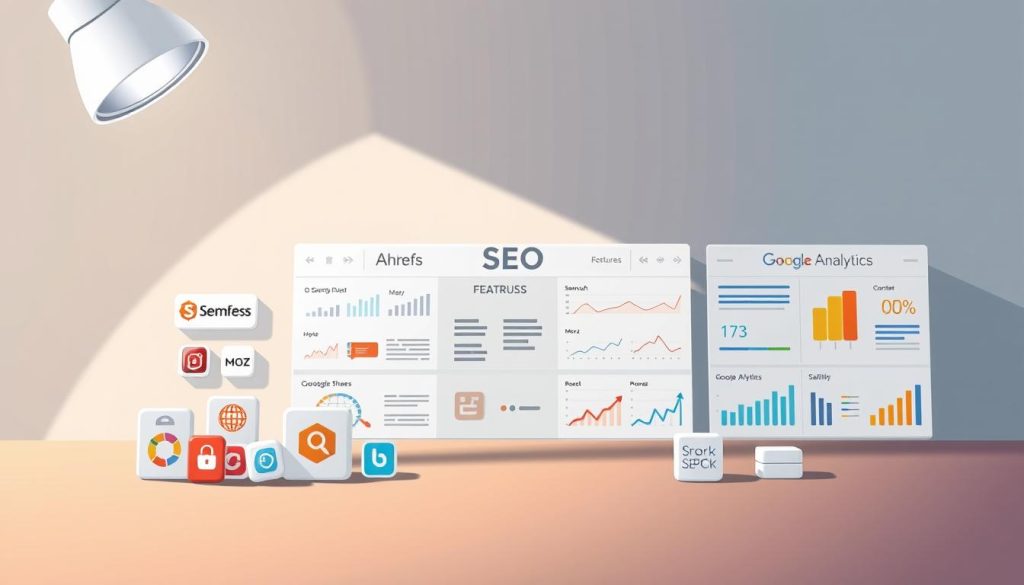As for the best SEO tools for beginners, starting out in search engine optimization can feel like a big task. There are over 350 free and paid SEO tools to choose from as of May 2025. Finding the right ones is key to getting your website seen more and getting more visitors.
The right SEO software can really help you shine online. Beginner-friendly SEO tools give you insights into keywords, backlinks, and how to make your content better. This helps you make smart choices to improve your website’s ranking.
Table of Contents
Main Objectives
- Identify your SEO needs before choosing tools.
- Opt for tools with user-friendly interfaces.
- Consider tools that offer free trials or versions.
- Look for tools that provide good SEO audits.
- Prioritize tools with great customer support.
Understanding SEO Fundamentals for Beginners
SEO is key for beginners in digital marketing. It’s vital to know the basics of SEO to have a strong online presence. The digital world keeps growing, making SEO knowledge essential.
What is SEO and Why It Matters in 2025
SEO helps websites rank higher in search engines for certain keywords. In 2025, SEO is more important than ever. It affects how visible and credible your website is online.
Most people start their searches online. So, having a well-optimized website is key to reaching customers.
Key SEO Metrics Every Beginner Should Track
Beginners should track important SEO metrics. These metrics show how well their website is doing. They include:
- Keyword rankings: How your website ranks for target keywords.
- Organic traffic: The number of visitors from search engines.
- Backlinks: The number and quality of links to your website.
| SEO Metric | Description | Importance |
|---|---|---|
| Keyword Rankings | Position of your website in search engine results for target keywords. | High |
| Organic Traffic | Number of visitors coming to your site from search engines. | High |
| Backlinks | Links from other websites pointing to your site, indicating credibility. | Medium |
The Best SEO Tools For a Beginner in 2025
New to SEO? You’re not alone in feeling confused by the numerous tools available. Let’s break down the best ones for beginners. Having the right tools can make optimizing your website easier. In 2025, several SEO tools stand out for their functionality and ease of use.
Keyword Research Tools for Market Analysis
Keyword research is key in SEO. It helps you know what your audience is searching for. Mangools is a favorite among beginners. It includes KWFinder, a tool that makes finding relevant keywords easy.
Semrush is also worth mentioning. It offers detailed keyword analysis and competitor insights. This helps you improve your SEO strategy.
On-Page SEO Optimization Tools
On-page SEO makes your web pages rank higher. Tools like Ahrefs have site audit features. They check your website’s on-page SEO and suggest improvements.
Yoast SEO is great for WordPress users. It gives real-time feedback on your content’s SEO. This helps you optimize as you write.
Technical SEO Audit Tools
Technical SEO ensures your website is easy for search engines to crawl and index. Screaming Frog SEO Spider is a top tool for technical SEO audits. It finds and fixes issues like broken links and slow page speeds.
Google Search Console is essential for monitoring your website’s technical SEO. It shows how Google views your site.
Backlink Analysis and Building Tools
Backlinks are important for SEO. They show search engines your content is valuable. Ahrefs offers a detailed backlink analysis tool. It helps you understand your backlink profile and find growth opportunities.
Moz also offers backlink analysis and link building strategies. This helps improve your website’s authority.
SEO Performance Tracking and Analytics
Tracking your SEO performance is key. Google Analytics is a must-have. It gives detailed insights into your website’s traffic and engagement.
Semrush also tracks your SEO performance. It monitors keyword rankings, traffic, and technical SEO health all in one place.
How to Choose the Right SEO Tools Based on Your Needs
Finding the right SEO tools is key to success. With many options, picking the right one can be tough. But, by looking at a few important factors, you can make a good choice.
Assessing Your Website Goals and Requirements
First, you need to assess your website’s goals and requirements. What do you want to achieve? Do you want more traffic, better conversions, or to be seen more online? Knowing your goals helps you find the right tools.
For example, if you want more traffic, tools like Ahrefs or SEMrush are great. But, if you want to be seen more online, Moz or Screaming Frog might be better.
Comparing Features, Usability, and Learning Curves
When looking at SEO tools, it’s important to compare their features, usability, and learning curves. Some tools have cool features but are hard to learn. Others are easy to use but might not have everything you need.
Think about how easy the tool is to use. Also, check if they offer good support, like customer help and tutorials.

Free vs. Paid: When to Upgrade Your SEO Toolkit
Many SEO tools have free versions or trials. This lets you try them before paying. Free tools like Google Search Console and Yoast SEO are good to start with. But, paid tools often have more features and support.
Should you pay for a tool? Think about how well it helps you meet your goals. If it’s working well, it might be worth the cost.
Step-by-Step Guide to Implementing SEO Tools
Starting with SEO tools can feel hard for beginners. But, a simple guide makes it easier. Knowing how to use these tools well is key. It helps your website get seen more and get more visitors.
Setting Up Your First SEO Campaign
To start your first SEO campaign, first figure out what you want to achieve. Pick the keywords you want to rank for. Then, do a deep keyword research with tools like Ahrefs or SEMrush.
Key steps to follow:
- Find the right keywords for your site.
- Make your website’s on-page elements better, like meta tags and titles.
- Set up and check your website on Google Search Console.

Interpreting Data and Making Actionable Changes
After setting up your SEO campaign, it’s important to watch how it’s doing. Use Google Analytics to see your website’s traffic and how people interact with it.
| Metric | Description | Actionable Change |
|---|---|---|
| Organic Traffic | The number of visitors coming from search engines. | Make your content better to rank higher. |
| Bounce Rate | The percentage of visitors who leave your site without taking action. | Make your website easier to use. |
| Conversion Rate | The percentage of visitors who complete a desired action. | Make your landing pages better for conversions. |
Common Beginner Mistakes to Avoid
As a beginner, it’s easy to make mistakes that hurt your SEO. Avoid keyword stuffing, ignoring technical SEO, and not checking your progress.
Best practices to follow:
- Use keywords naturally and avoid over-optimization.
- Keep your content fresh to keep search engines coming back.
- Check your website’s technical SEO to make sure it’s easy for search engines to find.
Conclusion: Building Your SEO Strategy Beyond Tools
A successful SEO strategy is more than just tools. It’s about making great content, being strong online, and always improving your site.
To really succeed in SEO, make a solid plan for your content. It should speak to your audience. Also, build links and keep optimizing to boost your site’s visibility and trust.
Knowing how to use SEO strategy well can help you grow for the long haul. It keeps you ahead in the fast-changing digital world.




Pingback: Top 3 On-Page SEO Best Practices for Beginners in 2025